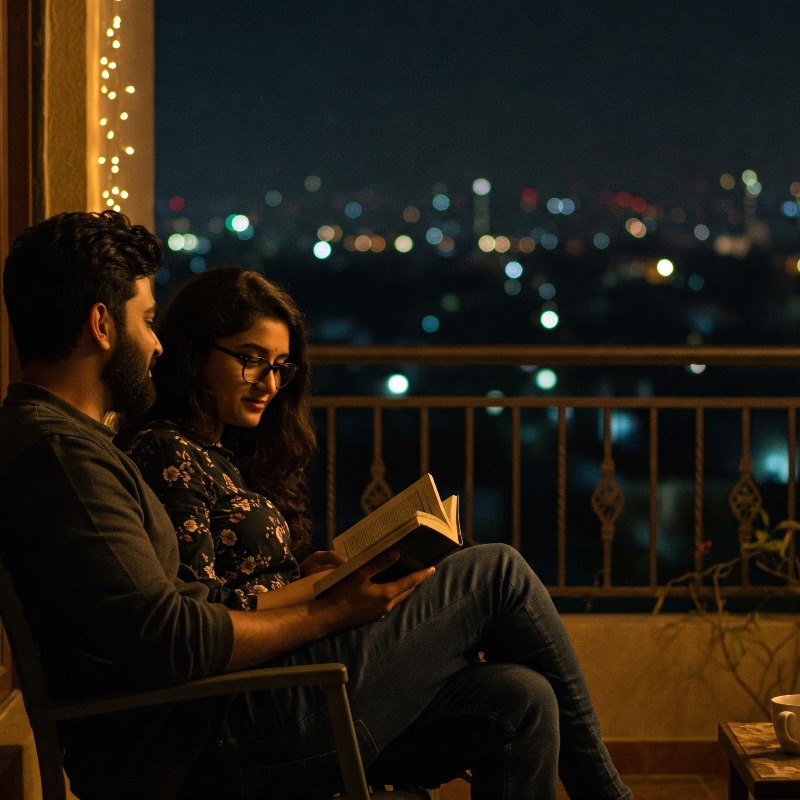Once upon a time, Aarav loved as he was told - singularly, obediently, with full-page declarations. But life had other notes.
At their tenth anniversary, Aarav gave Meera a watch, ticking like a vow. She gave him a fountain pen, ink flowing like trust. Both worked perfectly, but time bent differently after.
They were a good couple - maybe even great. Joint decisions. Clean finances. Respect. The kind of relationship that didn't rely on flowers to apologise or surprise weekend getaways to survive. It just...functioned. Like central air-conditioning. You didn’t think about it unless it stopped working.
Aarav thought this was “happily ever after”. Life, though, had other drafts.
Naina arrived at a corporate mixer, her saree like spilled ink - dark, fluid, unapologetic. Her laugh, sharp & off-beat, scratched thru' the vinyl hum of networking pleasantries. PR consultant. Married. Mother of a daughter who collected owl figurines. She wasn’t chasing anything - least of all Aarav. But she noticed him noticing her, not in that practiced predator-prey way, but with a quiet curiosity that asked: Do you, too, feel miscast in this play?
Their first conversation was about music, the kind that makes your bones ache.
Their second was about things they didn’t say to their spouses - 'cos there was nothing wrong, just… nothing burning.
Their third was a walk after dinner, where the silences began to speak louder than the words.
Naina was unbothered by binaries. She had built a good marriage, raised a kind child, and still found herself moved by a stranger’s voice when he read aloud from a Neruda poem. She didn’t apologise for it. Neither did he.
They laughed about the mythical “kill switch” - that societal expectation to snap off all emotion once love stepped outside the legally sanctioned perimeter.
“Do they really think we’re machines?” She asked once, sipping cold coffee.
“No, just scared that we’re not,” he replied.
There were no hotel rooms, no late-night lies. They met in parks, on footpaths, in that liminal space where truth felt safe.
What they shared wasn’t clandestine - it was just unspeakable in polite society.
When Naina got the Singapore posting, she told Aarav like one tells a co-conspirator: with pride & with grief.
There were no confessions, only continuations.
They didn’t say goodbye. They didn’t need to.
Their song paused, but never ended.
Even now, sometimes, he hears its melody in the spaces between text messages
Years later, Tara appeared on a Frankfurt flight, aisle seat, boarding with a linen tote & the kind of book that doesn’t get a film adaptation. She wore her grey-streaked hair like a badge, not a burden. Psychologist. Married. A son in college, a dog with arthritis, and a kitchen that always smelled faintly of turmeric & lavender.
Their first exchange was over a headphone tangle.
“Sorry - yours or mine?” She asked, holding up the identical blue airline earbuds with a smile.
They laughed. And that tiny glitch opened the door.
Instead of disappearing into their screens, they traded glances when the flight attendant announced the film selection.
“Four rom-coms & a war movie,” she muttered, arching an eyebrow.
“Either fall in love or blow up quietly,” he replied.
That was how it began:
Two strangers opting out of curated distraction in favour of conversation.
She told him how her father forgot her name before he forgot how to breathe.
He told her about the dog he couldn’t bring himself to replace.
By the time the flight landed, something had settled between them - not attraction, but recognition.
Over the next few months, they stitched a quiet thread between cities.
Airport lounges, bookshops, long emails at odd hours - intimacy without intrusion.
Tara had long stopped believing in the ownership model of love.
“Fidelity is not the cage,” she once wrote. “It’s how fully I show up, wherever I am.”
Their bond was sacred, not urgent. There was no countdown, no weekend bags packed in secret.
They didn’t crave a life together. They treasured the lives they already had while daring to carve out one more space between them - one not governed by monogamy’s map.
Tara never flinched from the truth. Neither did he.
They spoke of the “kill switch” with quiet disdain.
Not because they were reckless, but because they believed love could exist without colonising everything else.
There was no shame.
Only clarity.
A luminous, adult clarity that most of the world refused to accommodate.
Society demands one script: marry, love one, lock the rest away. But Aarav’s heart, like Naina’s, like Tara’s, spoke in plurals. He loved Meera’s quiet strength, Naina’s wonder, and Tara’s gravity. No one was replaced; nothing was stolen. Just truths orbiting beyond convention.
The cost isn’t guilt - never guilt. It’s missed birthdays, unanswered messages, and lives not fully lived. Naina still posts sunsets; Tara still sends Jungian essays. Their stories, folded gently, linger between reality & remembrance.
Tonight, on their Delhi balcony, Meera reads beside Aarav, glasses slipping. “Do you ever think about alternate lives?” she asks.
He smiles. “Every day.”
She doesn’t press. He doesn’t explain. Some truths are too sacred for words.
If love was meant to be singular, why does his heart speak so fluently in plurals?



 React
React
 React
React
 React
React
 React
React
 React
React